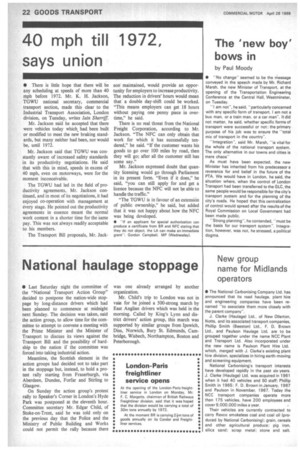40 mph till 1972, says union
Page 24

If you've noticed an error in this article please click here to report it so we can fix it.
• There is little hope that there will be any scheduling at speeds of more than 40 mph before 1972. Mr. K. H. Jackson, TGWU national secretary, commercial transport section, made this clear to the Industrial Transport Association, London division, on Tuesday, writes lain Shemff.
Mr. Jackson said he accepted that there were vehicles today which had been built or modified to meet the new braking standards, but many neither had been, nor would be, until 1972.
Mr. Jackson said that TGWU was constantly aware of increased safety standards in its productivity negotiations. He said that with this in mind, speeds in excess of 40 mph, even on motorways, were for the moment inconceivable.
The TGWU had led in the field of productivity agreements, Mr. Jackson continued, and in most of its negotiations, it had enjoyed co-operation with management at every stage. He pointed out the productivity agreements in essence meant the normal work content in a shorter time for the same pay. This was not always readily acceptable to his members.
The Transport Bill proposals, Mr. Jack
son maintained, would provide an opportunity for employers to increase productivity. The reduction in drivers' hours would mean that a double day-shift could be worked. "This means employers can get 18 hours without paying one penny piece in overtime," he said.
There is no real threat from the National Freight Corporation, according to Mr. Jackson. "The NFC can only obtain that work for which it has successfully tendered," he said. "If the customer wants his goods to go over 100 miles by road, then they will go; after all the customer still has some say."
Mr. Jackson expressed doubt that quantity licensing would go through Parliament in its present form. "Even if it does," he said, "you can still apply for and get a licence because the NFC will not be able to handle the traffic."
"The TGWU is in favour of an extension of public ownership," he said, but added that it was not happy about how the NFC was being developed.
• "If an applicant for special authorization can produce a certificate from BR and NFC stating that they do not object, the LA can make an immediate grant": Gordon Campbell, MP (Wednesday).




















































































































